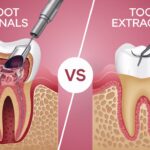If you’re reading this article, you likely understand the significance of maintaining good oral health. At URBN Dental, we prioritize your dental well-being and emphasize the importance of routine dental cleanings. In this guide, we explore various aspects of dental cleanings, including the types of teeth cleanings, their significance, and the role they play in preventing gum disease, tooth decay, and other dental issues.
The Basics of Dental Cleaning
Dental cleanings, also known as professional teeth cleanings, are a fundamental aspect of maintaining healthy teeth and gums. They involve the removal of plaque and tartar from your teeth and the gum line, a process that cannot be achieved through regular brushing and flossing alone. The American Dental Association (ADA) recommends that individuals undergo dental cleanings at least once every six months.Types of Dental Cleanings
There are two primary types of dental cleanings: routine teeth cleanings and deep teeth cleanings. Each serves a distinct purpose in maintaining your oral health.Routine Dental Cleanings
Routine dental cleanings, also referred to as professional dental cleanings or prophylaxis, are the most common type of dental cleaning. They are typically performed by a dental hygienist and include the following steps:- Dental Exam: Before the cleaning begins, the dental hygienist will conduct a thorough examination of your mouth to identify any signs of gum disease, tooth decay, or other dental issues.
- Plaque and Tartar Removal: Using specialized tools, the dental hygienist will carefully remove plaque and tartar buildup from your teeth and along the gum line. This step is crucial as it helps prevent cavities, gum inflammation, and tooth loss.
- Scaling and Root Planing: If the hygienist detects signs of gum disease, they may recommend scaling and root planing. This deeper cleaning process involves removing plaque and tartar from the tooth roots and smoothing the tooth surfaces to prevent bacteria from reattaching.
- Polishing: After the cleaning, the hygienist will polish your teeth to remove surface stains and leave them looking and feeling smooth.
Deep Teeth Cleaning
Deep teeth cleanings, also known as scaling and root planing, are reserved for patients with more advanced gum disease, also known as periodontitis. This condition can lead to symptoms such as bleeding gums, sore gums, loose teeth, and even tooth loss. Deep cleanings involve a more intensive approach:- Local Anesthetic: To ensure your comfort during the procedure, your dentist may administer a local anesthetic to numb the area.
- Scaling: Using specialized instruments, your dentist will remove plaque and tartar buildup from both above and below the gum line. This thorough cleaning is essential for treating gum disease.
- Root Planing: After scaling, the dentist will smooth the tooth roots to prevent bacteria from adhering and to facilitate the gums’ reattachment to the teeth.
The Importance of Routine Dental Cleanings
Now that we’ve covered the types of dental cleanings, let’s explore why routine dental cleanings are essential for your oral health:- Preventing Gum Disease: Routine cleanings are your best defense against gum disease. By removing plaque and tartar regularly, you significantly reduce the risk of gum inflammation (gingivitis) progressing to more severe forms of gum disease (periodontitis).
- Maintaining Healthy Teeth and Gums: Regular cleanings help keep your teeth and gums healthy, preventing issues like cavities, tooth decay, and tooth loss.
- Remove Plaque and Tartar Buildup: Even the most diligent brushing and flossing cannot remove all plaque and tartar buildup. Dental cleanings rid your mouth of these harmful substances, reducing the risk of cavities and gum disease.
- Early Detection of Dental Issues: During routine cleanings, dental professionals can identify potential dental problems early on, allowing for timely treatment and potentially saving you money and discomfort in the long run.
- Improving Overall Health: There is a growing body of evidence linking oral health to overall health. Regular dental cleanings can help lower the risk of systemic diseases like heart disease and diabetes.
What to Expect During a Dental Cleaning
If you’ve never had a dental cleaning before, you might be wondering what to expect during the procedure. Here’s a step-by-step overview:- Greeting and Examination: You’ll be welcomed by the dental hygienist, who will begin by examining your mouth to identify any issues.
- Plaque and Tartar Removal: The hygienist will use special instruments to gently remove plaque and tartar buildup from your teeth.
- Scaling and Root Planing (if necessary): If signs of gum disease are present, your dentist may recommend scaling and root planing, as mentioned earlier.
- Polishing: Your teeth will be polished to remove surface stains and leave them feeling smooth.
- Educational Guidance: The dental hygienist may provide tips on proper brushing and flossing techniques and offer guidance on maintaining good oral hygiene at home.
- Dentist’s Examination: In some cases, the dentist will conduct a follow-up examination to ensure that your oral health is on track.
Visit URBN Dental for Teeth Cleaning Today
Routine dental cleanings are the cornerstone of good oral health. At URBN Dental, we encourage you to prioritize your dental hygiene by scheduling regular dental cleanings. Whether it’s a routine cleaning or a more intensive deep cleaning, these procedures play a vital role in preventing gum disease, tooth decay, and other dental issues. Don’t underestimate the impact of regular dental cleanings on your overall health, and remember to maintain a consistent oral hygiene routine at home through brushing and flossing. Please schedule an appointment for deep cleanings or teeth cleaning at your nearest URBN Dental office – we have offices throughout Houston, including Midtown Houston, Uptown Houston, and Montrose.Sources:
Oral Health and Diabetes. (2018). Primary prevention of periodontitis: managing gingivitis. (2015).URBN Dental Services in Houston, TX
Houston | Katy | Montrose | West University Place | Greater Third Ward | Greater East End | North East Houston | Houston Heights | Central Northwest | Fairbanks | Acres Home | East Houston | Southeast Houston | Central Southwest | Fort Bend Houston | Brays Oaks | Meyerland Area | Sharpstown | Alief | Westchase | Memorial | Northwest Houston | Katyland | Whispering Lakes | Pine Lakes | Woodcreek Reserve















